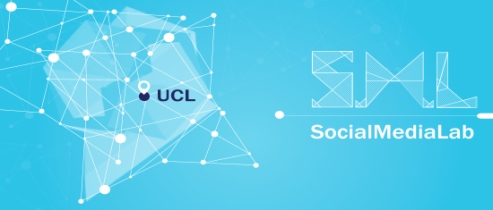 François Lambotte, PhD in Management Science, professor, and deputy dean of ESPO (University in economical, scoial, political, and communication sciences) is heading the UCL Social Media Lab.
François Lambotte, PhD in Management Science, professor, and deputy dean of ESPO (University in economical, scoial, political, and communication sciences) is heading the UCL Social Media Lab.
UCL means Catholic University of Louvain, a great city near Brussels in Belgium. But what does Social Media Lab encompass? François tells us more about it.
Nicolas Bry: What is the reason why you created the social media lab?
François: In 2013, I was part of a strategic group in charge of the positioning of our campus (situated in Mons) as regards new challenges related to entrepreneurship and digital economy. We realized that a number of similar labs in universities existed around the world. They were all focused on social media use by individuals (consumers and citizens). We decided to differentiate ourselves by looking to social media use in professional context (www.socialmedialab.be).
NB: What are the social media lab main domains of investigation? social graph analysis, data viz, linguistic and semantic analysis…
François: We currently work on two major research projects.
First, we particularly work on the intelligibility of social media activity for ourselves and others. Based on current research development in different fields (social graph, linguistics), we identify relevant measures of activities that can help us to make sense of the activity (i.e., online information sharing and collaboration). Then we prototype dashboards with those analytics. From there, we develop a number of research questions :
- What are the most suitable visualizations for each metric based on the literature on data visualisations?
- How do users make sense of these metrics?
- What role emotional design plays in the understanding of data visualization?
- How does this ‘sense making’ influence their online behavior?
- How does the context of usage influence this ‘sense making’?

Second, we just started a new project investigating collaborative behaviors on platforms corresponding to different steps of the entrepreneurial process: ideation, crowdfunding, crowdsourcing. Our aim is to identify collaborative tools and practices that would help foster collaboration among entrepreneurs active in Brussels.
NB: Can you describe the multidisciplinary team you have built? What skills are the most difficult to find? How do you foster cross-collaboration?
François: The rise of social media and its influence on our Society cannot be addressed through a single theoretical lens. The UCL Social Media Lab is a multidisciplinary team that gathers researchers from communication sciences, applied mathematics, linguistics, and consumer behavior. The multidisciplinary approach is key if we want to innovate.
Developers who are keen to work in social sciences teams are not easy to find. We have been very lucky to find Philippe our talented developer who is extremely receptive to our problematics and able to address our human and communication challenges.
In ordre to attract, people from different discipline, I make sure that we can as Social Media Lab give them something that they cannot find elsewhere namely data sets and high level equipments (e.g. we will have a fully equipped usability lab beginning of 2017).

NB: Have you developed specific methodologies to perform your projects?
François: We are still exploring innovation methods that would help us get more efficient on the long run. Yet, because of the small size of the team, we can still be very flexible in terms of coordination methods. I look particularly to methods such as design thinking (Tim Brown 2009) and boundary objects (GC Bowker, 2015). As regards the latest, I am particularly sensitive to the role of objects such as prototypes as objects situated at the boundaries of different worlds that are interdisciplinary teams but also between the world of research lab and the one of organizations.
NB: How do you collaborate with external companies? Are you focused on large companies, or do you also work with startups?
François: The strategy of interestment is key. We develop collaborations based on the concret issues that our partner are facing using social media in professional context. It is our starting point.
We develop collaboration with SMEs, like Whatever or SoPrism, situated mainly in Wallonie as our project is supported by FEDER and FSE. Both funding are targeted to help regional economy to grow. Yet, we also develop international collaboration such as the recent agreements with Orange innovation and with elCurator.
NB: Do you plan to have a place for coworking, open innovation, and cocreation at Louvain university?
François: Yes, our Social Media Lab is situated on the same floor as the « student start lab » of UCL. Our aim is of course to foster collaboration between our lab and the incubator.





Not sure if you know how the Trump campaign were using social media (well Facebook at least) to determine advertising targets – and way more worryingly exactly what ads to serve them, as part of the 2016 election campaign.
It’s basically impossible to keep this information out of the wrong hands – ao while today it’s nothing more offensive than ads that follow you round the web, it holds many disturbing issues for the future.